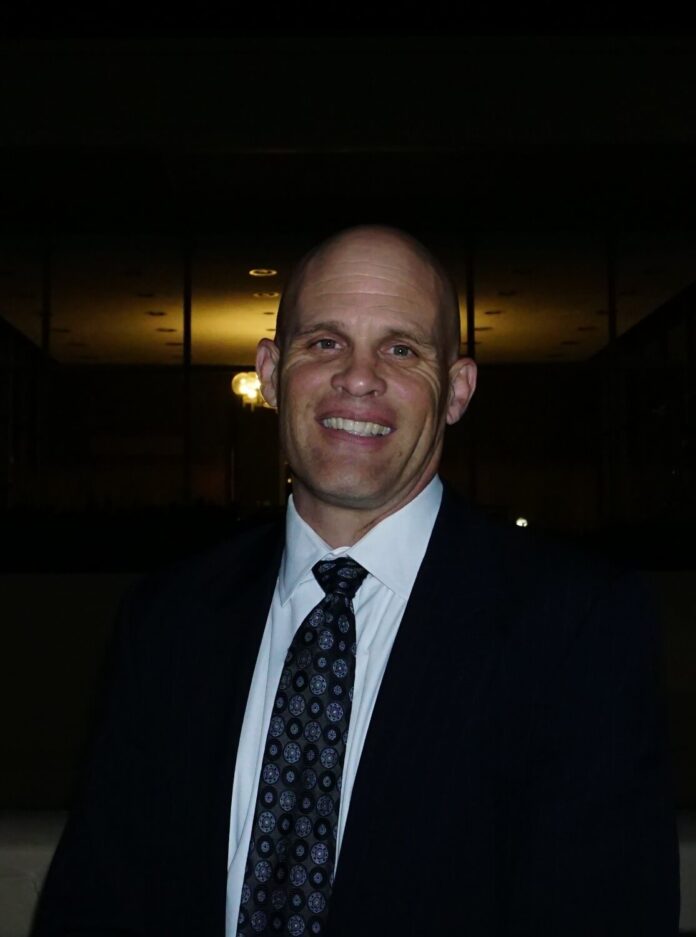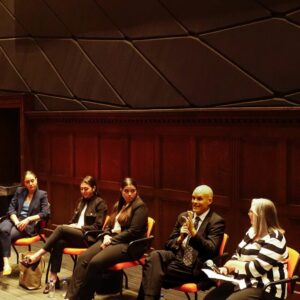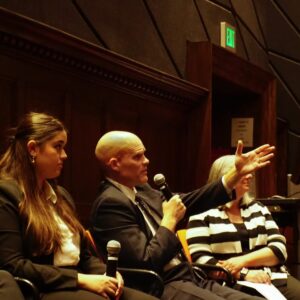
Facing rows of students with notepads and bright computers, 9th U.S. Circuit Court of Appeals Judge John Owens sat beside his three current federal law clerks. On a visit to Occidental’s Choi Auditorium Nov. 8, Owens gave a few minutes of background about his career in law before diving into a full hour of student Q&A.
Owens said he originally decided to go to law school after working for the Golden State Warriors in his undergraduate career at UC Berkeley, where he thought getting a Juris Doctorate would help him advance in the sports world. However, he said he was inspired to go into criminal law after being taught by Stanford professor Gerald Uelman. Uelman worked on the OJ Simpson trial, famously writing the line, “If it doesn’t fit, you must acquit,” which attorney Johnnie Lee Cochran delivered to the court room.
“I have colleagues on my court who said when they were 5 years old, they wanted to be a judge,” Owens said. “I was not one of those people.”
According to Owens, becoming a judge on the Federal 9th Circuit Court of Appeals is all about timing, particularly in the political realm. Prior to his appointment by the Obama Administration in 2013, Owens spent time in both private and public law including litigating for O’Melveny & Myers LLP and Munger, Tolles, & Olson. Much of his earlier work was focused on white-collar crime, he said. This followed two of his own federal clerkships, the first in 1996 for Judge Clifford Wallace on the 9th U.S. Circuit Court of Appeals and the second in 1997 for Justice Ruth Bader Ginsburg on the U.S. Supreme Court.
“I thought I actually had a decent perspective on both sides because I’ve represented criminal defendants [and] I’ve represented the government,” Owens said.
During his clerkships, Owens said he learned two important lessons. Justice Ginsberg taught him the value of hard work in achieving goals and Judge Wallace the value of self-care in the career of law, according to Owens. As for hiring his own law clerks, Owens said he gets hundreds of applications a year and generally looks at grades in law school, recommendations from people he knows and diverse backgrounds and experiences.
“I have my own perspective, what helps me is when I hire people who come from different walks of life than mine, that tends to give me a better world sense,” Owens said. “I hire people who actually want to go out into the world and do something.”
The three clerks in attendance, Alison Luna, Isabel Alexiades and Ana Ribadeneira, had just begun their clerkship a few months prior. According to the trio, Luna attended Berkeley Law, Alexiades Columbia Law and Ribadeneira Stanford Law, where Owens himself attended.

According to Alexiades, she worked on the Brown Daily Herald student newspaper as an undergraduate and as an editor-in-chief at The Brown Journal of World Affairs, which helped her learn grammar and style rules that were helpful later on. As for her current federal clerkship under Judge Owens, she said that the responsibilities — getting to know the cases, working on bench memos, helping him draft dispositions — have been helpful to her in pursuing later goals of government litigation.
“You get exposure to a lot of different types of cases and areas of the law, so if you’re not entirely sure what type of law you want to practice, you can see different cases,” Alexiades said. “Also, you get to see a lot of different styles of lawyering, what’s effective advocacy, and what doesn’t work so well. Having that close exposure early on in your career is really valuable.”
Alexiades said her original career interest was investigative journalism, but after an internship at NBC, she found an interest in law and took a political journalism first amendment class and constitutional law class at Brown.
“I think that those [classes] were both valuable because I actually got to see what it would be like to read cases,” Alexiades said. “You can know that you like to read, but the type of reading you do in law school is different.”
For students at Occidental, visiting assistant politics professor Alec Arellano said that while there is no pre-law major or minor, there are many available classes and events students can participate in.
“Good grades matter a lot for admission to law school,” Arellano said. “Taking classes you’re passionate about and can do well in matters more than taking one specific class.”
Arellano said he teaches a constitutional law course almost exclusively focused on reading law cases, and that there are other departments that have classes focused on the US legal system.

“It’s really important to figure out what legal work involves. People are drawn to law because it’s a way to make a difference, and Oxy is a very socially involved school,” Arellano said. “It might not be the best fit for certain people’s personalities or affinities. It’s important to have a sense of what you’re getting into.”
According to Arellano, participation in the Law Society, pre-law advising from Professor Marisol León, internship opportunities from the Hameetman Career Center and JusticeCorps are a few ways he recommends getting involved on campus.
“If you’ve gotten into a school like Oxy, it means you’ve done something right. It means you had some help along the way, you know, but take advantage of that,” Owens said. “Do as well as you can at Oxy and, you know, the sky’s the limit.”
Contact Mollie Barnes at mbarnes@oxy.edu
![]()






























